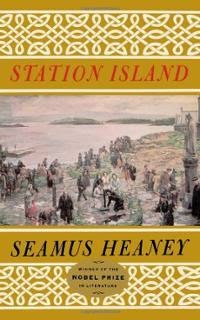I've signed up for edX's course
the Art of Poetry, taught by Robert Pinsky. (There is still time to sign up--it just started yesterday.)
I'm excited about it--immersing myself in poetry is what I planned to do with the next three or four months, and I have been diligently working on my own poems for a few weeks now. What perfection to have Pinsky's guidance and the inspiration of all the participants and poets whose work is featured in the course.
Part of the coursework is to present our own "anthology": favourite poems by other authors and what they mean to us. I present my first response here.
Last Look
by Seamus
Heaney
In Memoriam
E.G.
We came upon him, stilled
and oblivious,
gazing into a field
of blossoming potatoes,
his trouser bottoms wet
and flecked with grass seed.
Crowned blunt-headed weeds
that flourished in the verge
flailed against our car
but he seemed not to hear
in his long watchfulness
by the clifftop fuschias.
He paid no heed that day,
No more than if he were
sheep’s wool on barbed wire
or an old lock of hay
combed from a passing load
by a bush in the roadside.
He was back in his twenties,
travelling Donegal
in the grocery cart
of Gallagher and Son,
Merchant, Publican,
Retail and Import.
Flourbags, nosebags, buckets
of water for the horse
in every whitewashed yard.
Drama between hedges
if he met a Model Ford.
If Niamh had ridden up
to make the wide strand sweet
with inviting Irish,
weaving among hoofbeats
and hoofmarks on the wet
dazzle and blaze,
I think not even she
could have drawn him out
from the covert of his gaze.
I am blown away by
this poem on so many levels. Each word is essential, and if stayed with a while,
brings me straight into the seedy physicality of this moment, and a wonderful,
halfwild physicality it is.
On first reading I
am swept away with compassion and sympathy for this old man who is looking out
over his world at his long ago life. Because I came from the Canadian prairies,
with strong connections to farms and farmers and old people whose clear
insistent ways were being—unbeknownst to me, who couldn’t understand their
aggravation—sheared away from their centrality in the world by the unhesitating
crush of change, I feel in my own body the empty-handedness of his loss.
Here of course I am
reading more into the poem than is actually stated. He may not feel loss, but I
do. I fought hard against the rigid thinking of my elders, even as I loved them
immensely and suffered unbearably under their disapproval of my “crazy” beliefs
and life. But at the same time I rose from these people just as this man rose
from the hills and roads and work that shaped him. Now that they are gone, and
I’m living in a world where few of my acquaintances knew or felt bonded to the people
and ways—much of which had great value to me even then—that I ran from and now have
lost, I find myself bereft, and longing for a visit home.
How often I am not
quite in 2014, standing instead gazing into 1963. When I read this poem I am
the gazer and the onlookers, both.
I love that the
onlookers are looking on. Though he
is by now a lock of hay on a bush, a small integral element of his environment,
he is real and current to them. They may not exist for him, but for them he
exists intensely; they witness him as I witness my elders and their vanished way
of life. Heaney and his unnamed companion have great empathy for the gazer, but
they are on the roadside, they are comfortable in now; they love the man of the
past and the present both at once.
It is with great
delight that I arrive at the final stanza, where Heaney reminds me of the
magical precedents of Ireland, of the queen of the Land of Youth who came from
the sea and enticed Oisín away to the Otherworld for three hundred years. She is
from a time far more ancient than the gazer’s cart and Model Ford, and she is
as much of him, more even, than she is of Heaney and of me.
“Last Look” is a trip
into a beloved past that is firmly rooted in today, tying both together with
the dancing power of a goddess on her horse clattering about the beach.
And even she can’t
flush him from the covert of his gaze. What a wonderful word! He is the hay, he
is the hills and cart, he is the bird of memory hidden in the brush.
%2B1496-97.jpg)


